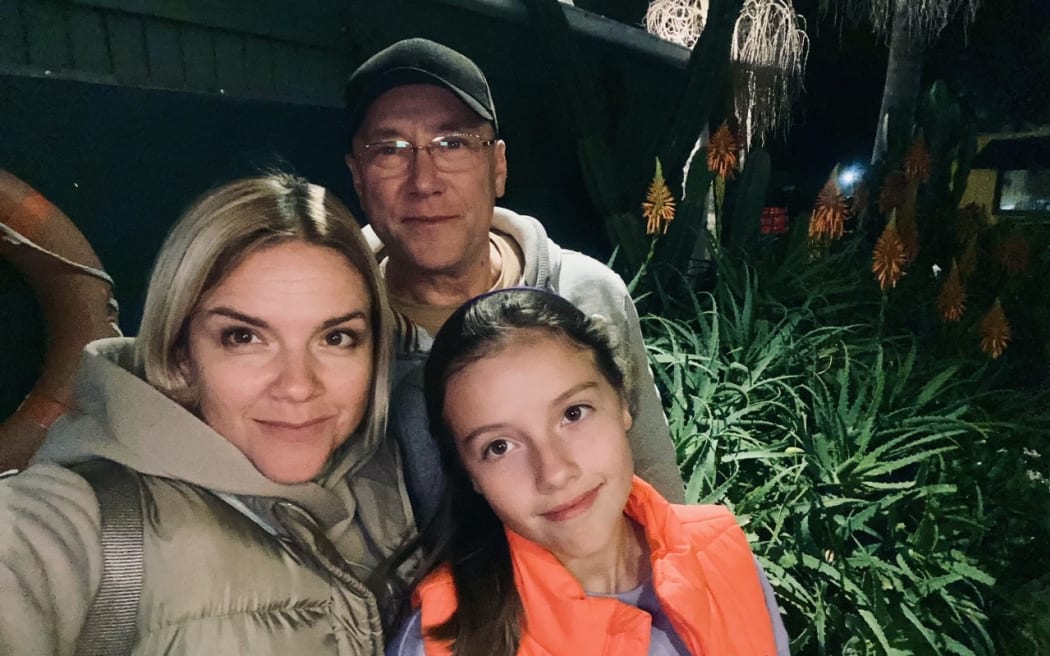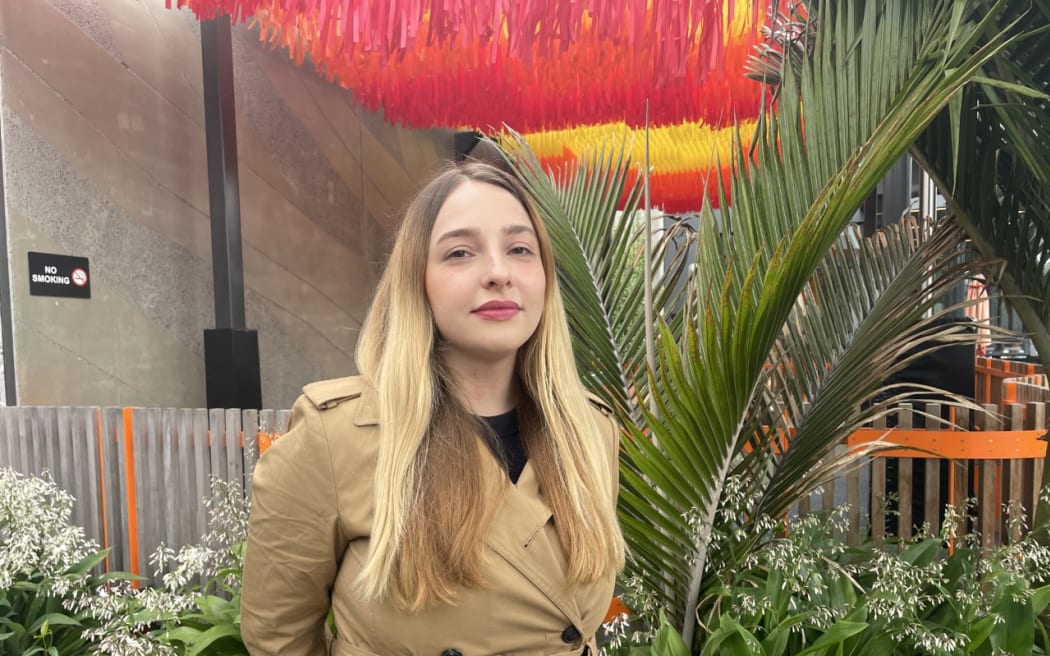
Iryna Barbasheva and her family found hardship establishing themselves in New Zealand. Photo: Supplied
Ukrainians are escaping to New Zealand only to find themselves locked out of jobs and housing, and turned away from MSD offices.
The arrivals say they're facing a harsh new reality on the 2022 Special Ukraine Visa, having believed it would give them a chance to "breathe out" and feel safe.
Last week a Ukrainian support group asked Immigration Minister Michael Wood to expand the financial, language and health support for Ukrainians, claiming the lack of support had driven some of them back to their war-torn homeland.
Iryna Barbasheva is among 1026 people granted one of the special visas since the pathway opened in March.
She fled Kyiv to Tauranga with her husband and 11-year-old daughter in April, bringing just one 20kg suitcase each and next-to-no money, she said.
The family were able access the visa because they were sponsored by her stepdaughter who is living and studying at university in New Zealand, she said.
It was a place to start, Barbasheva said, although her stepdaughter's family couldn't offer much financial support and things quickly became "very tight".
It took months longer than Barbasheva expected to secure her own income.
She said she struggled to obtain an IRD number without a permanent address, then was turned down from several jobs and told that the ideal candidate would have a New Zealand work history.
"I hear everywhere New Zealand is short on staff in different areas. But then I'm going to interviews and they're not taking me. I'm thinking, you know, that's how it works here," she said.
"Ukrainians are hard workers. I don't know New Zealand knew that or not, but they're a nation of hard workers."
Barbasheva counts herself lucky because she can speak English, while her husband cannot.
She eventually got a job as a store manager.
"I'm glad that I got a job. But just think about if I didn't - I went to all those interviews and I didn't get job and... we have to stay somewhere, and we have to eat, we have to feed our daughter," she said.
Housing has been another hurdle - renting a two-bedroom unit in Tauranga costs about four times what it does in Kyiv.
Barbasheva and her family have been shifting around short-term accommodation offered by church friends and relatives.
At one stage when they thought they were going to become homeless, she said she turned to MSD.
Barbasheva said she was told she didn't qualify for support.
"When we were told we had to find a new place to live, and I don't have job at that time and I didn't know what to do - that was very dark."
In a statement, MSD confirmed people must be a New Zealand citizen or a permanent resident to qualify for welfare assistance.
It said work brokers were available to help people on temporary visas to find work, but "temporary visa holders are not entitled to income or emergency housing support."
Some Ukrainian arrivals spend months in visa queues
Entering the New Zealand workforce has been even more challenging for Anna Drobot, who fled from Dnipro to Auckland with her Ukrainian-Kiwi partner.
Initially they hoped she may be able to secure a 2022 Special Ukraine Visa.

Anna Drobot arrived with her Kiwi-Ukrainian partner. Photo: RNZ/Katie Todd
She said she and her partner entered an expression of interest for that visa, and waited two months for a response.
That expression of interest was declined, but Drobot was invited to apply for a 'Partner of a New Zealander Visitor Visa.’
She travelled to Aotearoa on a visitor visa and is now trying to obtain that partnership-based work visa.
That has incurred another long wait.
Drobot, a former procurement specialist, applied in September, and fears it may be months more before she can work.
"That's a long time," she said.
"Coming from a country where it's war right now, and not being able to work and not able to support myself... it's a bit stressful. I have to fully depend on my partner and his family, which is obviously not very good for my mental state."
Immigration NZ response
In a response, Immigration New Zealand said it aimed to process 2022 Special Ukraine Visas "as soon as possible" and Expressions of Interest tended to be processed within five week days.
"However, some visa applications can take longer, and the majority of these applications are processed within 15 week days. There are several reasons a visa application can take time to process."
Where an individual can't be granted a 2022 Special Ukraine Visa, it said it worked to explore other avenues before deciding their visa application
"This process can take time and could contribute to longer wait times for a decision for these applicants. "
It said it couldn't issue an Invitation to Apply on the basis of sponsorship, if the sponsor didn't meet the eligibility requirements.
"Individuals from the Ukraine are unable to apply for a Working Holiday Scheme visa as there is no scheme available for the Ukraine, however partners of New Zealand citizens or residents are able to apply for partnership visas.
"We will reach out to the individual to better understand her circumstances and the relevant visa options."
Drobot said the lack of support for Ukrainians in New Zealand was a sharp contrast to what she experienced overseas.
"I don't think there was any help from the government whatsoever. Whenever I came from Ukraine to Europe, on the border there were volunteers who were helping out with translation, if necessary, and they were giving out SIM cards for for you to keep in touch and just left lots of information... where to find your embassy, who to call."
"Here, on the other hand, the only kind of help that that I had is from our Ukrainian community."
No long-term certainty for arrivals
Iryna Barbasheva has come to love parts of New Zealand, including the nature, the active lifestyle and the school her daughter has settled in.
But there's a looming sense of uncertainty that her life here can't be permanent.
"I can see us now staying here for another probably 10 years for sure so. Right now, it's okay. But we don't know what to expect," she said.
"There is no extension program, I mean we don't know anything about that what's gonna happen with us after these two years. There is no option for us that we can apply for, like residency."
Her mother and younger sister remain in Kyiv, where there's been missile strikes and power outages.
She said Ukrainians fleeing to Aotearoa wanted to "relax and kind of breathe out, say 'okay we're safe now'."
Instead, she said, they are facing "so many new challenges".
Mahi for Ukraine co-founder Kate Turska believed the 2022 Special Ukraine Visa had "failed in its execution."

Mahi for Ukraine co-founder Kate Turska says Ukrainians are being put off by high costs and a lack of support. Photo: Supplied
Since March 404 people have used it to come to New Zealand, out of an estimated 4000 people the government said it could help.
Turska said people were being put off by high costs and a lack of support.
She has questioned why Ukrainians are essentially just being offered a working visa, instead of full wraparound support.
"We just really want to see what else can be done in order to support these Ukrainians who have been offered shelter in New Zealand," she said.
"The prime minister has talked the big talk at the UN. We would really like to see the cabinet following through with some actions."
Visa a 'failed policy' - Ukraine support group
Mahi for Ukraine met with Immigration Minister Michael Wood last week to share its concerns.
At the time, the minister said he was aware some Ukrainians had struggled to settle and returned, and that he had "regular meetings and communications" with Ukrainian support teams here.
"Ultimately though, people need to make decisions based on what is best for them and their families."
Wood's said he was "currently considering whether an extension is warranted" for the visa policy, due to end next March.
Immigration New Zealand said to be eligible for the Ukrainian Special Visa the sponsor must have been born in Ukraine or hold or have held Ukrainian citizenship or permanent residence, and the applicant must have been normally resident in Ukraine (including Crimea) as of January 2022.
New Zealand-based eligible sponsors can apply to bring their immediate family, including parents, grandparents, siblings, and adult children, to New Zealand. Each of those people can also include their partners and dependent children in their visa application.
Immigration New Zealand said it continued to prioritise urgent visa applications from Ukrainian nationals.


